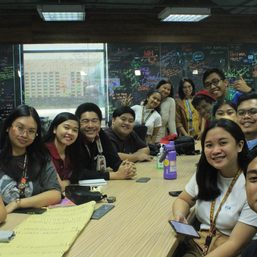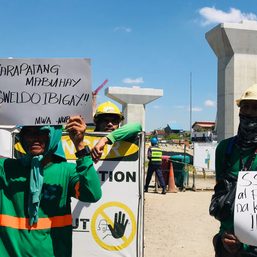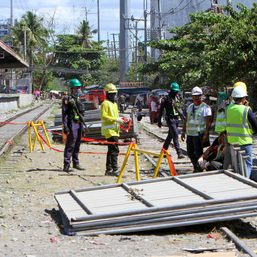SUMMARY
This is AI generated summarization, which may have errors. For context, always refer to the full article.
![[OPINION] Read this before you judge a non-graduate](https://www.rappler.com/tachyon/2021/04/iSpeak-education-nongrad.jpg)
“You’ve had a taste of life with income, but that shouldn’t stop you from continuing your education.”
People are right to say this, but that hasn’t stopped me from not continuing my education.
The decision not to continue one’s education is often blamed on a false dichotomy. People think that you are either arrogant enough to disregard the value of education because you’ve found a way to make a living, or have no other choice because you can’t afford it or don’t have the academic standing. True as this might be for some cases, I don’t think people get the real complexity of this decision-making process.
It isn’t like picking a hobby; it is as much of a commitment as choosing a university to attend or a course that fits your interests and goals. In fact, it was tremendously more difficult for me, because it came with no assurance, no path. It was the road less taken, and I had no signposts or vehicle to get me where I wanted to go.
How do you make people see things your way when they can’t even place themselves in your shoes? You use objectivity. So, I went through the process of answering what questions pushed me to make my decision.
What’s the return of investment in going to college?
In Filipino culture, this isn’t as pertinent of a question. We come from a culture where higher education is something parents are obliged to provide, or something a child is obliged to earn through scholarships and financial grants. Unlike our American counterparts, we don’t think about having student loans to pay off.
I had to quantify, then, what the value of an education was. I had several career opportunities in mind, so I broke down what it would be like to pay off the education I needed to get the job in the first place:
I started with law. A pre-law education would cost me around P120,000 per year, P480,000 for a degree. Then there’s law school: an average of P80,000 per year, or P320,000 to complete it. You’ll need to spend around P800,000 — not including cost of living and day-to-day expenses — and then move on to taking your bar exam. Once you’re a lawyer, the realistic salary expectation for someone starting out is at P480,000 a year on average, and will also be highly dependent on what area of law you’re undertaking.
Let’s say you earn P480,000 for your first two years; ideally, you’d have earned back your education in those two years. The problem is that taking law isn’t as clean-cut as it should be. You’d have to account for the amount of time and effort you put in throughout your 8-year journey trying to earn that “attorney” title. Law is also notoriously one of the most difficult fields to work in, and what people don’t talk about is that career growth there is cutthroat and goes beyond skill.
I then calculated for a career in art. The college I wanted to go to valued a degree at around P250,000 per year, or P1,000,000 for all four years. Graphic designers are paid an average wage of P175,000 to P185,000 per year. That alone means that it would take me, at the very least, 5 years to pay off a degree, and that’s if I don’t deduct living costs. The industry is known to be underpaid and often taken for granted; workers in this field often put up with high-level demands on salaries that don’t match their scope of work.
You also have to account for what the employment landscape looks like at present and in the future. Careers aren’t a linear path as much as we’d like them to be; why else would there be career mismatches?
What about getting the knowledge and skills that you need?
Some industries require you to have a degree, which is why I don’t apply this advice to people who seek to be doctors or architects. Most employers, however, are more reliant on skills and experience than in degrees.
The truth of the matter is, degrees are not as important as they used to be. Back then, during the time of my parents and their parents, degrees were your only ticket towards getting a good job. How else would you get any viable experience for work during those times?
These days, it’s much easier to get experience. Education has come a long way, and even if it isn’t the perfect landscape yet (I’m looking at you K-12), resources are widely available if you know where to look – especially with the advent of the world wide web and instant gratification. From there I can utilize what I learn to create or work on something tangible that I could show to employers to qualify me for jobs.
There are so many outlets and learning resources nowadays. Good at drawing? Start a portfolio, do freelance work on the side. Are you interested in entrepreneurship? Go to seminars, start an Instagram shop, or go to Facebook Marketplace and participate in e-commerce. Want to learn more about an industry? Ask around and network, get an internship. The possibilities are, as cliché as it is to say this, endless.
College doesn’t have to be the be-all and end-all. Thinking that college is a golden ticket to success is unfair to degree holders who still have to work for their achievements just like the rest of us.
What about knowing where to go?
If you think about it, most of us already know the answer. One of the first things that help us develop as kids is when we’re asked what we want to be when we grow up. Education and exploration help pave a path from dream to reality.
This was also probably my biggest motivator not to go to college, because I didn’t want to be boxed in. I knew that I couldn’t be confined to an industry, because I had skillsets that spanned from the Humanities, to the Arts, to Business, all the way to the Sciences. I wanted to give myself room to grow and expand my horizons. I knew that success doesn’t have a cookie-cutter formula, so I gave in to my willingness to explore.
My conclusion is very simple. Education will always be there. Just because I don’t have a degree now doesn’t mean that I can never have one. You can always change your mind about your education, like when you shift from one course to another. Is that looked down upon? Sure, it is, but why should you care about what people think?
Take that gap year you’ve been wanting, discover your own interests and skills, or build up what you have. At the end of the day, college will always be there. It’s just a matter of whether you would rather enter college with doubts, or learn enough about what you actually want to make an informed decision. – Rappler.com
Theryce Bernardo is a 2020 HUMSS graduate from St. Paul College, Pasig, and the Vice President for Partnerships and Linkages of Kabataang Tambuli ng Pasig.
Add a comment
How does this make you feel?
![[PODCAST] I’ve Got An Opinion: You don’t need to be from a ‘Big 4’ school](https://www.rappler.com/tachyon/2020/07/ive-got-an-opinion-sq-2.jpg?fit=449%2C449)
![[OPINION | New School] Maybe I should’ve taken a gap year](https://www.rappler.com/tachyon/2021/01/ns_onlineclasses_1280.jpg?fit=449%2C449)
![[Time Trowel] Mentorship matters](https://www.rappler.com/tachyon/2024/04/mentorship-matters.jpg?resize=257%2C257&crop_strategy=attention)
![[OPINION] Education for life: Weaving ethics in all subject areas](https://www.rappler.com/tachyon/2024/03/Education-for-Life-Weaving-Ethics-in-All-Subject-Domains.jpg?resize=257%2C257&crop_strategy=attention)
![[OPINION] Limited intake of international students: Is Canada knee-capping its future?](https://www.rappler.com/tachyon/2024/02/tl-canada-forgeign-student-cap-02232024-2.jpg?resize=257%2C257&crop_strategy=attention)

![[Rappler Investigates] Who’s fooling who?](https://www.rappler.com/tachyon/2024/02/rodrigo-sara-duterte-2019.jpeg?resize=257%2C257&crop=167px%2C0px%2C900px%2C900px)



![[Episodes] Fairness to freelancers](https://www.rappler.com/tachyon/2024/02/Freelance-Writers-Guild-of-the-Philippines-rate-guide.jpg?resize=257%2C257&crop=217px%2C0px%2C720px%2C720px)

![[In This Economy] A counter-rejoinder in the economic charter change debate](https://www.rappler.com/tachyon/2024/04/TL-counter-rejoinder-apr-20-2024.jpg?resize=257%2C257&crop=267px%2C0px%2C720px%2C720px)
![[Vantage Point] Joey Salceda says 8% GDP growth attainable](https://www.rappler.com/tachyon/2024/04/tl-salceda-gdp-growth-04192024.jpg?resize=257%2C257&crop_strategy=attention)
![[ANALYSIS] A new advocacy in race to financial literacy](https://www.rappler.com/tachyon/2024/04/advocacy-race-financial-literacy-April-19-2024.jpg?resize=257%2C257&crop_strategy=attention)





There are no comments yet. Add your comment to start the conversation.